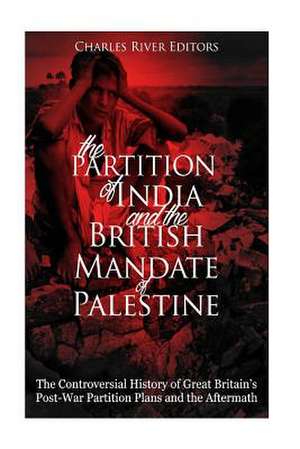The Partition of India and the British Mandate of Palestine
Autor Charles River Editorsen Limba Engleză Paperback
*Includes online resources and a bibliography for further reading
The Ottoman Empire quickly collapsed after World War I, and its extensive lands were divvied up between the French and British. While the French gained control of the Levant, which would later become modern day nations like Syria, the British were given the Mandate for Palestine from the newly created League of Nations. The British Mandate for Palestine gave the British control over the lands that have since become Jordan, Israel, the West Bank, and the Gaza Strip. The terms of the British Mandate incorporated the language of the Balfour Declaration, recognizing the "historical connection of the Jewish people with Palestine." The British were also tasked with creating a Jewish state, which the United States Congress endorsed in 1922.
In 1947, the British delegated the issue of partitioning the British Mandate to the United Nations, and the U.N. General Assembly set up the Special Committee on Palestine (UNSCOP). UNSCOP eventually came up with what is now known as the U.N. Partition Plan of 1947. The Partition Plan carved up two strange looking states, but their motive was to create an Israel in which the Jewish population was a 55% majority, while Palestine had an over 90% Palestinian Arab majority. Meanwhile, the city of Jerusalem would be administered internationally, due to the sensitive religious concerns of Muslims, Christians, and Jews. In addition to several Christian holy spots, Jerusalem's Al-Aqsa Mosque is the third holiest site in Islam, and it is situated right next to the Western Wall, the Jews' holiest remaining site.
On May 14, 1948, the British Mandate officially expired. That same day, the Jewish National Council issued the Declaration of the Establishment of the State of Israel. About 10 minutes later, President Truman officially recognized the State of Israel, and the Soviet Union also quickly recognized Israel. However, the Palestinians and the Arab League did not recognize the new state, and the very next day, armies from Egypt, Syria, Lebanon and Iraq invaded the former British Mandate to squelch Israel, while Saudi Arabia assisted the Arab armies. Jordan would also get involved in the war, fighting the Israelis around Jerusalem, but ultimately Israel would survive.
Thanks to its commercial complexion and the power invested in a board of directors, British rule in India was characterized by economic monopolies, aggressive trade practices, punitive taxation, and the impoverishment of vast regions of India. Much of the Company's industry was based on a policy of producing and exporting raw materials from India and importing manufactured goods to satisfy an almost unlimited local market. Home industries and the domestic cottage textile industry, in particular, were heavily impacted by this, and with the addition of land taxes and a general regime of economic exploitation, the British East India Company grew to be a heavy burden on the shoulders of ordinary Indians.
British India ultimately covered some 54 percent of the landmass and 77 percent of the population. By the time the British began to contemplate a withdrawal from India, 565 princely states were officially recognized, in addition to thousands of zamindaris and jagirs, which were in effect feudal estates. It stands to reason, therefore, as India began the countdown to independence after World War II, that the Indian Muslim leadership would begin to express anxiety over the prospect of universal suffrage and majority rule. At less than 20 percent of the population, Indian Muslims would inevitably find themselves overwhelmed by the Hindu majority, and as the British prepared to divest themselves of India, ancient enmities between Hindu and Muslim, long papered over by the secular and remote government of Britain, began once again to surface.
| Toate formatele și edițiile | Preț | Express |
|---|---|---|
| Paperback (2) | 83.64 lei 6-8 săpt. | |
| – | 83.64 lei 6-8 săpt. | |
| – | 101.71 lei 6-8 săpt. |
Preț: 83.64 lei
Nou
Puncte Express: 125
Preț estimativ în valută:
16.00€ • 16.71$ • 13.25£
16.00€ • 16.71$ • 13.25£
Carte tipărită la comandă
Livrare economică 05-19 aprilie
Preluare comenzi: 021 569.72.76
Specificații
ISBN-13: 9781985308077
ISBN-10: 198530807X
Pagini: 76
Dimensiuni: 152 x 229 x 4 mm
Greutate: 0.11 kg
ISBN-10: 198530807X
Pagini: 76
Dimensiuni: 152 x 229 x 4 mm
Greutate: 0.11 kg
